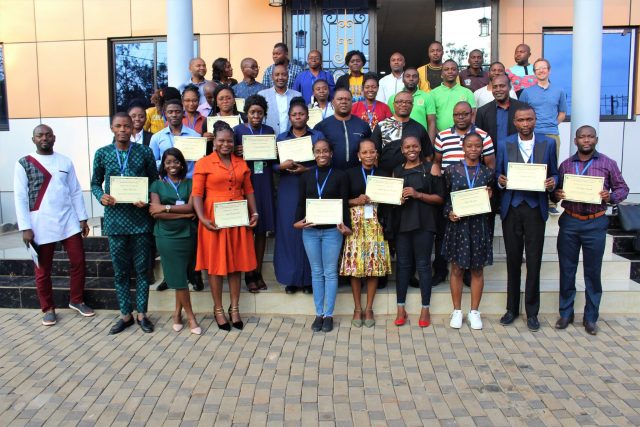
Course participants with certificates and CRID officials, facilitations
Trainees of a course organised by the Centre for Research in Infectious Diseases, CRID, in Yaounde have pledged to use the knowledge and expertise gained to contribute towards stepping up the fight against malaria. They made the pledge Friday, August 19 at the CRID centre in Odza, Yaounde during a certificate award ceremony at the end of the training course. The course, which ran from Monday 8 to Friday, August 19, was aimed at building the Trainees’ knowledge on molecular advanced tools currently used in malaria entomology, to enable them monitor disease transmission and control by understanding vector genetics and vector parasite relationships. The course participants were researchers, PhD students and early career staff aiming to contribute to malaria elimination efforts. They came from several African countries. The training was organised in collaboration with the Pan-African Mosquito Control Association, PAMCA, and the Bill and Melinda Gates Foundation. Speaking at the ceremony, Rosalia Joseph, from Namibia and PAMCA Regional Coordinator for Central and Southern Africa, said: “I have learned a lot in terms of insecticide resistance whereby we use microsites to analyses exactly the genes that transmit resistance. I have also learned about gene flow which we can use to leverage and see which mosquitos are vectors and also to see if they are local or from cross-border countries”.
To transfer knowledge gained to peers
She promised to transfer the knowledge gained to her peers back home. “When I return to my country, I will definitely build capacities amongst my peers, and col-leagues to train them on these molecular techniques to confirm the genes that are transmitting this. So, in essence, it will help us tailor interventions which we will use to curb insecticide resistance and speed up the process of malaria prevention in Namibia,” she added. On her part, another participant, Zongo N. Odette, from Burkina Faso, called on the population to engage in the fight against mosquito transmitted diseases, sensitise others and to take measures for a common fight against this disease. “In this training we have learned from some doctors and professors who have shared their experiences on the tools to fight diseases transmitted by mosquitoes. We know that the methods in fighting malaria that we have in place have some limitations in resistance. So, we need new methods to fight it and during this workshop we have acquired new tools to step up the fight,” Zongo said. “When we return to our respective countries, we intend to put into use what we have acquired here in order to contribute to the fight against diseases transmitted by mosquito bites,” she added. Meanwhile, Mponga Peter Gitanga from the National Malaria Control Programme of Tanzania, said “the training was very successful as we are not going back as we came”. “We have been enriched with knowledge especially in surveillance, particularly in vector surveillance. Malaria is still a problem in Africa and especially Tanzania or Cameroon. When we go back, we are going to practice what we have learned here and not only helping ourselves but the rest of Africa. I am happy for this kind of collaboration and the efforts in saving Africa and the rest of the world,” Gitanga. The Deputy Head of the Department of Medical Entomology and Coordinator of PAMCA project at CRID, Dr Elanga Emmanuel, said that the objectives of the training have been fully attained. “We wanted to equip the participants with the background knowledge on molecular entomologies of malaria surveillance. After this workshop, we will put in place a follow-up mechanism to ensure that they implement what they have learned here back in their respective institutions,” he added. Prof Charles S. Wondji, Executive Director of CRID said he was impressed with the way participants integrated and reacted during the training. He added that the training should “not be a one-off, but a steppingstone to do more”.
The Guardian Post No 2545 Wednesday August 24, 2022, Page 9 HEALTH / ECONOMY. www.theguardianpostcameroon.com






